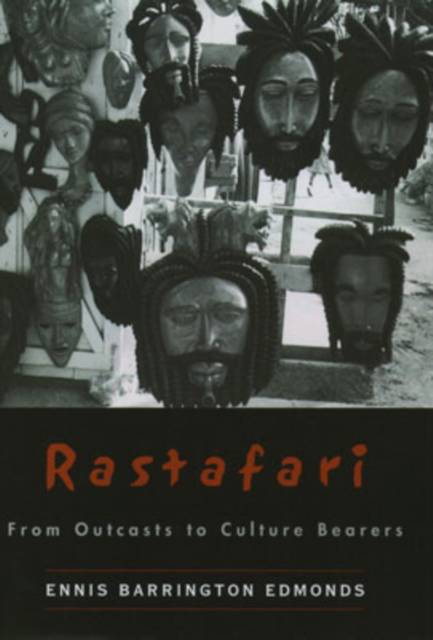
- Retrait gratuit dans votre magasin Club
- 7.000.000 titres dans notre catalogue
- Payer en toute sécurité
- Toujours un magasin près de chez vous
- Retrait gratuit dans votre magasin Club
- 7.000.0000 titres dans notre catalogue
- Payer en toute sécurité
- Toujours un magasin près de chez vous
241,95 €
+ 483 points
Format
Description
Since its emergence from the ghettoes of West Kingston, Jamaica in the 1930s, the Rastafarian Movement has been transformed from an obscure group of outcasts to a vibrant movement that has not only become firmly entrenched in Jamaican society, but has successfully expanded beyond the Caribbean to North America, the British Isles, and Africa. Ennis Barrington Edmonds provides a compelling portrait of the Rastafarian phenomenon and chronicles how a once-obscure group, much maligned and persecuted, became a dominant cultural force in the world today.
Edmonds charts the evolution of the relationship between Rastafari and the wider Jamaican society. In the early years of the movement, there was outright confrontation and repression, as Rastas were seen as a threat to Jamaican society. This evolved into a grudging tolerance and eventually an aggressive appropriation of Rastafarian symbols in the 1970s and 1980s--as evidenced by the veritable coronation of reggae artist Bob Marley--resulting in the "culture tourism" of the late twentieth century. Edmonds focuses in particular on the internal development of Rastafarianism as a social movement, with its network of "houses" (small, informal groups that form around leading Rastas) and "mansions" (larger, more communal associations), to track the process of this strikingly successful integration. He further demonstrates how Rastafarian artistic creativity, especially in fashioning the music and message of reggae, was a significant factor in the transition of Rastas from the status of outcasts to the position of culture bearers.
Rastafari presents an intimate account of a unique movement, which over the course of several decades had entrenched itself in Jamaican society and has become the international cultural and political force it is today.
Edmonds charts the evolution of the relationship between Rastafari and the wider Jamaican society. In the early years of the movement, there was outright confrontation and repression, as Rastas were seen as a threat to Jamaican society. This evolved into a grudging tolerance and eventually an aggressive appropriation of Rastafarian symbols in the 1970s and 1980s--as evidenced by the veritable coronation of reggae artist Bob Marley--resulting in the "culture tourism" of the late twentieth century. Edmonds focuses in particular on the internal development of Rastafarianism as a social movement, with its network of "houses" (small, informal groups that form around leading Rastas) and "mansions" (larger, more communal associations), to track the process of this strikingly successful integration. He further demonstrates how Rastafarian artistic creativity, especially in fashioning the music and message of reggae, was a significant factor in the transition of Rastas from the status of outcasts to the position of culture bearers.
Rastafari presents an intimate account of a unique movement, which over the course of several decades had entrenched itself in Jamaican society and has become the international cultural and political force it is today.
Spécifications
Parties prenantes
- Auteur(s) :
- Editeur:
Contenu
- Nombre de pages :
- 208
- Langue:
- Anglais
Caractéristiques
- EAN:
- 9780195133769
- Date de parution :
- 26-12-02
- Format:
- Livre relié
- Format numérique:
- Genaaid
- Dimensions :
- 155 mm x 241 mm
- Poids :
- 435 g

Les avis
Nous publions uniquement les avis qui respectent les conditions requises. Consultez nos conditions pour les avis.






